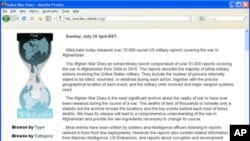The website known for publishing leaked materials from governments and other organizations has posted online part of more than 90,000 documents it says are secret U.S. military files about the Afghan war. Some of the leaked documents suggest the American military suspects Pakistan's spy service, the Inter-Services Intelligence, of helping militants.
The website WikiLeaks posted documents that cover the period between January 2004 and December 2009.
Pakistan's Ambassador to the United States, Hussain Haqqani, insisted his country is fully committed to fighting Islamist insurgents. He said the released documents do not reflect current realities.
Nothing new
But Afghan Presidential Spokesman Waheed Omar told reporters in Kabul the information is nothing new, and the Afghan government is examining the documents.
"Most of this is not new," Omar noted. "Most of this is what has been discussed in the past. And most of this is what we have always raised with our international partners. And this is going to help raise more awareness."
An international relations professor at Pakistan's Quaid-i-Azam University, Ishtiaq Ahmad, cautions that most of the information contained in the documents cannot be verified. He also dismisses the leaked documents as "one instance" that cannot overcome the U.S.-Pakistani relationship.
"What about the seven-, eight-months long closer, unprecedented relationship that Pakistan and the United States have been able to establish between their top-level civilian and military leaders during this year," Ahmad asked.
He points to U.S. praise of Pakistan's ongoing military offensive against domestic Taliban elements along the country's border with Afghanistan. Pakistan also has helped U.S. authorities in arresting a number of Afghan Taliban militants, including the group's second-in-command, Mullah Baradar, in Karachi.
Double game?
But if the allegations are true, Afghan political analyst Akmal Dawi says it would show a disturbing "double game" by Pakistan, especially as it receives billions of dollars in U.S. aid. He says the reports suggest ISI representatives met directly with the Taliban to help organize attacks on coalition and Afghan forces as well as plot assassinations of Afghan leaders.
Dawi says it could be Pakistan's aim to remove elements sympathetic to Afghan President Hamid Karzai, causing him to approach Islamabad for help in reaching a deal with Taliban militants.
"They certainly can undermine him," Dawi said. "They can certainly weaken his local position, his support within the tribe and different ethnic groups that are in Afghanistan."
Since an international conference in January, President Karzai has actively pursued a plan to reintegrate and reconcile with militants who lay down their weapons, support the constitution, and renounce ties with international terrorist groups.
Pakistani officials have long voiced support for this plan, even offering their assistance to mediate based on their previous support of these groups during the Soviet occupation of Afghanistan more than two decades ago.
Afghan, Pakistani Reactions at Odds Over Leaked US Documents
- By Sean Maroney













